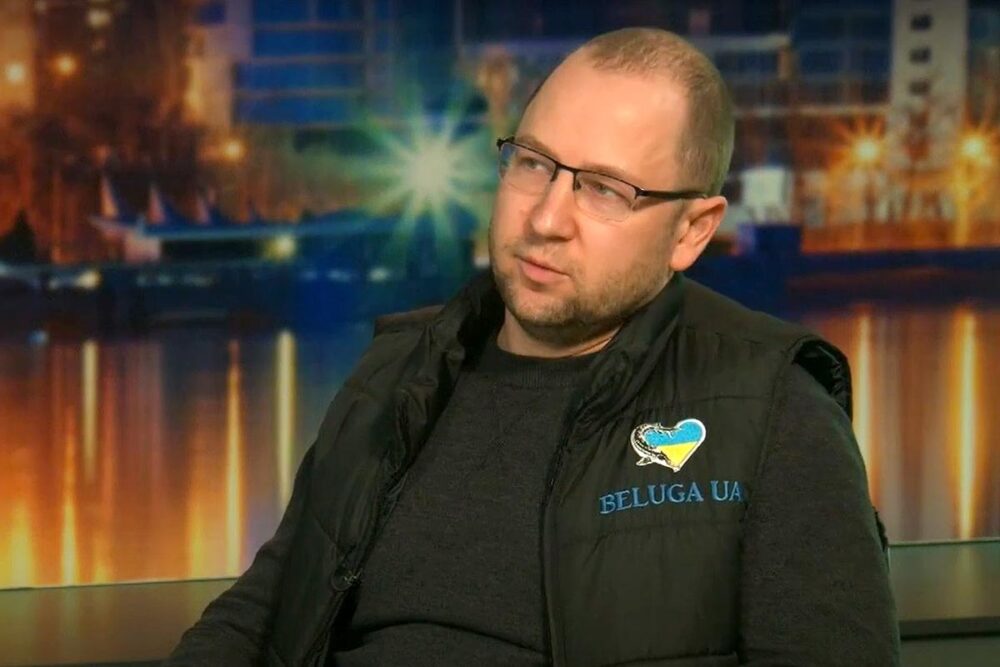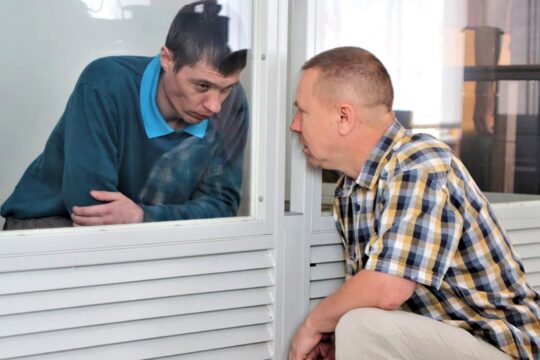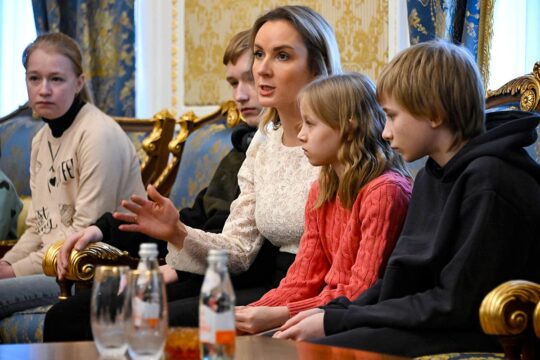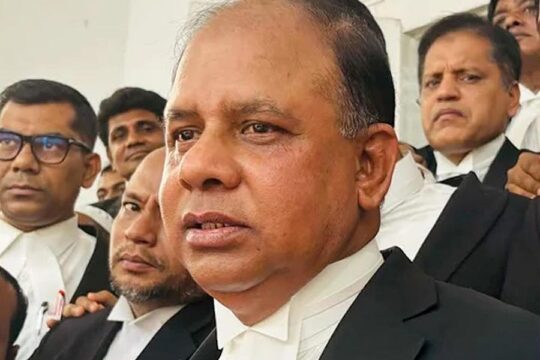For many victims of war crimes in Ukraine, reaching out to law enforcement agencies and courts is not just a formality, but an effort to seek justice – at the very least, a legal one. Victims do not always have sufficient resources, experience or even strength to go down this road. This is when the victim’s lawyer steps in – a professional who not only knows the law but can also handle the traumatic details of the case. In Ukrainian war crimes trials, lawyers representing victims are starting to play a more noticeable role. Their work is a careful balance between ethics, psychology and procedural discipline.
“Victims are very sensitive; they may feel unsafe, and the situation itself is traumatic for them. Therefore, the lawyer often serves as a buffer between the victim, the investigation and the court in order to sort out organisational issues in the interests of a person who has already endured suffering,” said lawyer Iryna Kapalkina, who’s joined the non-governmental organisation Ukrainian Legal Advisory Group (ULAG) in 2023 but has been intermittently working on war crimes since 2014. "Being victims' lawyers, we are literally helping the state prosecution. Prosecutors often look at a case strictly from their own perspective, but we see the bigger picture and can better defend the victim," explained lawyer Artem Piskarev, who works in Zaporizhzhia and has over 20 years of legal experience. He represents victims of war crimes, including civilians and military men released from captivity. He also takes on cases of people whose businesses have been impacted by Russian shelling.
“An important aspect the victim’s lawyer must focus on is ensuring that the verdict is legally flawless and irrevocable. After all, Russian military men may be detained at some point, or their lawyers may file an appeal, and the case will be re-examined. If the evidence is recognised as inadmissible, all the suffering endured by the victims may turn out to be futile or even repeated,’ says Andrii Yakovlev, a lawyer from Kyiv and an expert in international humanitarian law at the NGO Media Initiative for Human Rights.
Who appoints a lawyer for victims?
According to the Criminal Procedure Code of Ukraine, the involvement of a defence lawyer is mandatory for the accused, while for victims it is only an option. Victims can hire their lawyer, get free legal help covered by the government, or seek legal help from NGOs that work with international funders. Also, some lawyers take on cases on a pro bono basis, meaning free of charge.
Specialists from the Coordination Centre for Victim and Witness Support of the Prosecutor General’s Office also advise victims to seek lawyers’ help. This centre began operating in January 2024 with the support of Ukraine's international partners. The centre's specialists provide psychological, medical and social support to victims and witnesses in conflict-related criminal cases. They also keep them informed about the course of the proceedings. According to the Centre, by the end of their first year of work, specialists had provided support to 1,198 victims, including 873 children, 146 women, 179 men, 83 victims of sexual violence, 22 military men released from Russian captivity, and 89 civilians released from captivity.
In addition, legal assistance to people who suffered torture and abuse during the war can be provided by lawyers working at free legal aid (FLA) centres. These services are funded by the state. Lawyers from FLA can also be appointed to any war crimes case. According to Oleksandr Baranov, Head of the Coordination Centre for Legal Aid, FLA lawyers are currently working on three conflict-related sexual violence cases and 11 cases of torture. He says a victim’s lawyer is still a crucial part of a fair trial, especially in situations where prosecutors don’t always pay enough attention to the victim because of their workload or other reasons. Not so long ago, the legal aid system was used less often in these cases, with non-governmental organisations being more involved. But with the decrease in funding for the latter, the situation has changed.
Lawyers not only advise victims but also assist them in filing civil claims for damages which the prosecutor's office does not submit. According to Baranov, this is where the most intensive work of a victims’ lawyer begins: you need to justify the amount of the claim, gather evidence, and prove moral and material damage. “We emphasise that there is no statute of limitations for war crimes. If a person decides to come forward even after a year, we will help to file a complaint, contact law enforcement agencies and start the process,” Baranov said. A lawyer is appointed in the FLA system at the client's request. If a person is considered a victim in criminal proceedings, for example, if this is confirmed by an extract from the Unified Register of Pre-trial Investigations, he or she is provided with a lawyer or a representative.
The spectrum of victims' motivations
Some of the victims are finding the courage to talk about their ordeal, while others are trying to forget and turn the page on this chapter of their lives. This is thought to be often the case for women who have suffered sexual violence. “There are some people, especially women, who have only now come to realise that they can speak out. They have been living with this for the past few years. If there is a possibility of receiving psychological support, it is a significant advantage. I have a client who reached out to me precisely after attending sessions with psychologists. Yes, it still hurts, but psychologists sometimes advise their clients to consider contacting the police, the prosecutor's office or a lawyer,” Liudmyla Vyhivska said.
Vyhivska has been working in criminal justice since 2001 in Kyiv and has been involved in war crimes cases since 2022. She is a member of the women lawyers’ association JurFem and a lawyer with the legal aid hotline JurFem-Support, which helps women who have suffered sexual violence, particularly in the context of war. It is mainly through this hotline that she gets requests from victims who need legal support in difficult and sensitive cases. She is currently providing legal assistance to approximately ten victims of sexual violence and have roughly the same number of other war crimes cases. Most of her cases concern war crimes committed by Russian military men in the Kyiv region, but there are also victims from the Kherson and Donetsk regions. “There are people who have survived, regained inner strength and do not want to revisit that experience. It will be more difficult with them if the cases go to court and their presence is required,” Vyhivska added.
Kapalkina points to a similar range of victims’ expectations. “Some people just want to see the verdict on paper along with the compensation amounts. Others are worn out when a case goes on for two years; They simply want it to be over. There are also those who expect the maximum sentence, and then we have to explain that the verdict does not rely on emotions, but on evidence and hard facts,” she said.
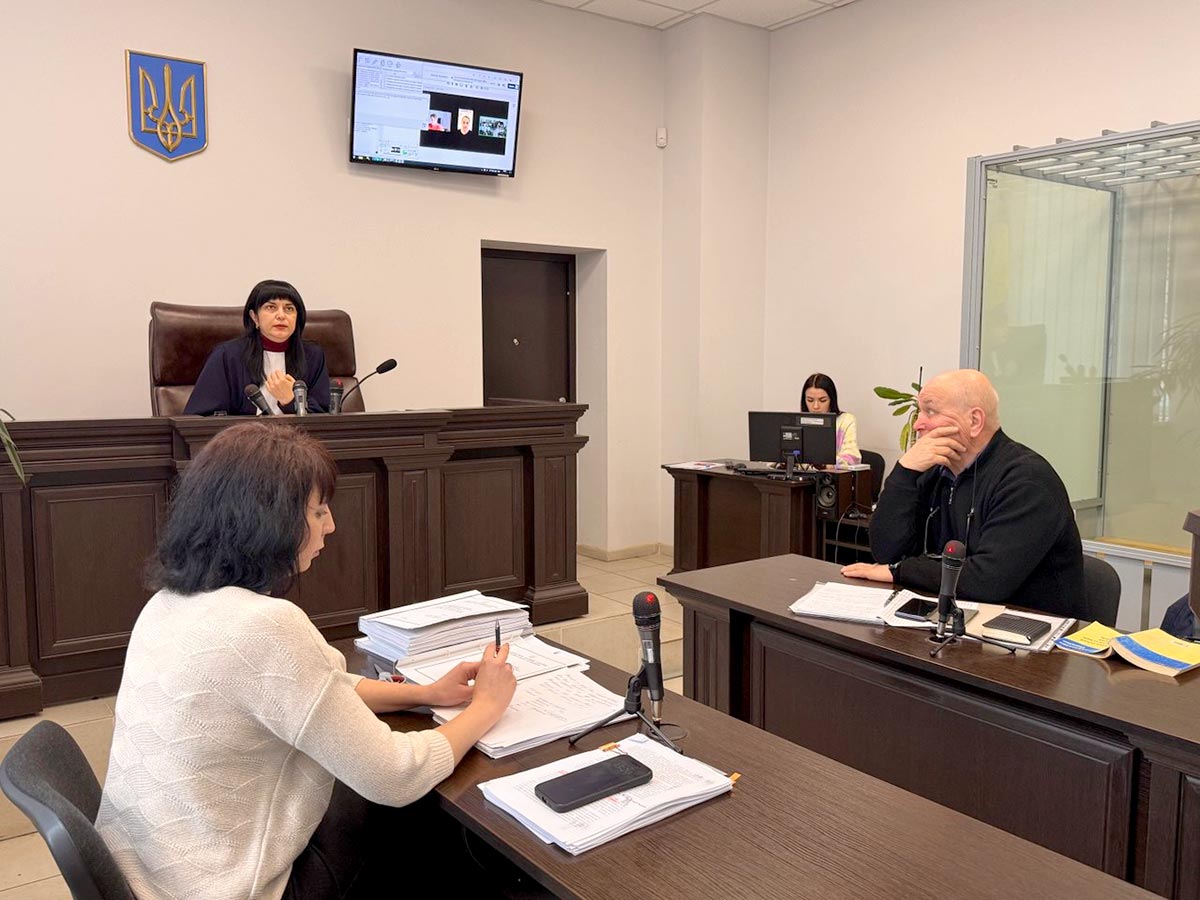
One of the frustrations is that many trials are held in absentia. When Piskarev is asked about justice for his clients, he replied unequivocally: “There will be none for my clients. Because we will not be able to legally punish this person.” Yet he agrees that verdicts, even if issued in absentia, are important. “If we do not talk about these crimes, do not identify and sentence those responsible, they will never be held accountable. This will not happen today or tomorrow, perhaps not even in a year. But justice will prevail,” he believes.
Crucial video interviews
The legal work of a victim's lawyer is not just about attending hearings. It includes building a strategy, drafting procedural motions, gathering evidence, organising expert reviews – everything that allows them to put together a case that can hold up in court.
Yakovlev is involved in the investigation of one of the most notorious crimes committed by the Russian army – the shelling of Olenivka prison, where Ukrainian prisoners of war were killed. He represents the victims and, together with prosecutors, participates in planning strategic actions. “In the Olenivka case, we were involved as a party representing the victims and acting as their liaison. There is already a notice of suspicion in this case, although so far it is only for not providing medical assistance to prisoners of war after the prison's shelling. But even this episode, which is clear and simple, is enough to highlight Russia's responsibility. We participate in planning, briefings, and sometimes we are even invited to the prosecutor’s office to share our thoughts and report on our work,” he explained.
According to Vyhivska, the most important thing is to thoroughly prepare the victim for questioning, which must be recorded on video so that it can be used during the pre-trial investigation and court hearings, thereby avoiding any further trauma to the victim. Medical records constitute important evidence. They document physical injuries, bone fractures, scars, and signs of violence, allowing experts to establish a timeline for when they were inflicted. Forensic psychological examinations are particularly important in cases of sexual violence, in which they are currently mandatory. They are drafted on the basis of video interviews, without the victim's additional questioning. “Experts often identify signs of psychological trauma clearly related to the events described in the case file. This is important proof of the committed offence, as it corroborates the victim’s statements with an objective conclusion,” Vyhivska points out. In war crimes cases, a psychologist may be appointed to assist both during the pre-trial stage and at the hearings, if requested by the victim. “If a motion to appoint a psychologist is granted, the specialist participates in the hearings, providing real-time support to the victim,” Kapalkina explained.
A psychologist provides advance support to those who decide to testify in court, meeting with them several days before the hearing to assess their emotional state and prepare them for possible reactions to questioning by both parties. “The psychologist observes the victim's reaction and can immediately intervene to provide support, reassurance and help them gather their thoughts. They also give advice on how to react to questions from the court or either party,” says Kapalkina. Some victims do not wish to appear in court. In such cases, the lawyer submits a motion requesting that the case be heard without their participation or only with the legal representative’s attendance.
The protection of rape victims
Conflict-related sexual violence cases are tried in closed hearings. Upon request of the victims’ lawyer or prosecutor, hearings may also be closed if the relatives of the victims remain in temporarily occupied territories. “Investigators often tell victims or witnesses: ‘No one will ever see you; no one will ever hurt you.’ But they promise something they cannot guarantee. That is why we always insist on closed hearings: the enemy is constantly watching everything,” Piskarev said. “This is one of the most important elements of victim-oriented approaches in conflict-related sexual violence cases,” Vyhivska explained. “The court reviews the [previously recorded video of the] testimony, and that is usually sufficient. I have not yet had a case in my practice where a victim was summoned in person. And the defence has not objected.”
It seems it has happened though. For example, last year, the Velykooleksandrivskyi District Court of the Kherson oblast sentenced Vladik Nebiev, a serviceman of the 94th Special Purpose Regiment of the Russian National Guard, to 12 years in prison in absentia. The court ruled in favour of the prosecution, finding that in July 2022, the accused raped a woman in the temporarily occupied territory of the Kherson oblast. The verdict states that the victim testified in court. It also mentions that the woman submitted a request not to question anyone from her village because she did not want them to know about the case. Despite this, investigators interviewed witnesses, including residents of her village, and summoned some of them to court for witness testimony.
In war crimes cases, the victim's lawyer has to navigate between his or her own professional judgement, the client's perspective, and the demands of the procedure. “There is my understanding of the case as a lawyer, there is the victim's response, and there is the court's point of view. It is important to find a balance between these elements to ensure that the case is properly considered without unnecessary delay. I always explain to the victim that the trial is not a game. It must be impartial and respectful of all the participants' rights,” Kapalkina said. In other words, victims’ lawyers sometimes have to explain to their clients that questions asked by the judge and the prosecutor are not intended as attacks against them but are part of the judicial process.
Vyhivska believes that the victims of sexual violence being stigmatised is a serious problem that is not given enough attention. In small communities where everyone knows one another, victims may feel misunderstood or even judged. “We need to root out society's profoundly embedded prejudice against conflict-related sexual violence victims, and also think about the children born as a result of abuse. This is a topic that, in my opinion, is still being shamefully silenced,” she pointed out.
A view on the opponent
Another challenge is the court's workload. According to Piskarev, courts are significantly overloaded, which affects reasonable case examination timeframes and creates potential delays. Sometimes, court hearings are disrupted due to the proximity of courts to combat zones, for example, in Zaporizhzhia and Kherson oblasts. To minimise risks for victims, lawyers may request that their clients attend hearings via videoconference. However, technical problems – poor internet connection, sound or image delays – can seriously affect the course of the hearing, irritating participants, increasing interrogations’ duration and causing court hearings to be postponed. “In which case, the judge may insist that the victim attends and testifies in court, so that everyone has the opportunity to ask questions and see the person's reaction,” Kapalkina said.
The interviewed lawyers have mixed feelings about their opponents – the defenders of the accused. Piskarev admits that, as a matter of principle, he would not take on the defence of war criminals or collaborators. As for his colleagues who work with such defendants, he believes that most of them comply with formal procedural rules but do not show the same vigour they would typically show in ordinary criminal cases, not related to the war. Kapalkina has had a different experience. She referred to a case where the accused’s lawyer explained to the victims that, as a human being, he understood the tragedy that has occurred, but as a defence lawyer, he was obliged to fulfil his professional duties. “The defendant’s lawyer presented his arguments and disagreed with the evidence. He didn’t just sit there and say he had no objections; he really tried to defend his client,” she stressed.
A path to reparations?
A verdict in a war crimes case is a significant legal step, but for victims, it often does not mean the story is over. This is especially true when the convicted person is out of reach. In such cases, a sense of justice being served has not been fulfilled. Often, Ukrainian courts rule in favour of victims seeking compensation. For example, last year, the Shevchenkivskyi District Court of Kharkiv convicted Oleksandr Medelyaev, second-in-command of the 3rd Tank Battalion of the 1st Tank Army of Russia's Western Military District, for the murder of a woman from the Kharkiv region. The court also partially satisfied the claim of the victim's mother and sentenced the convicted man to pay her 1 million hryvnias (about 21,000 euros) in moral damages. Lawyers believe that Russia has no intention of complying with these rulings. But a court decision may become important to confirm the right to compensation through the International Register of War Damage, created under the authority of the European Council. Ukrainians can use this database to submit claims for damages caused by Russia's war against Ukraine for future compensation.
The procedure for receiving compensation is still being developed, emphasised Kapalkina, so the amount indicated in the verdict may not correspond to the actual amount that will be paid.
Lawyers representing victims of war crimes are regularly exposed to highly traumatic information. Vyhivska reckoned that the most sensitive aspects of cases have an undeniable impact, but not during court hearings: by that point, she has already reviewed the case file numerous times and is prepared for anything she may hear. Rest and driving help her recover after difficult hearings, she said, giving her a sense of control and restoring her peace of mind. “There are terrifying things. Amputations are being suffered, and rape. There are cases where civilians are being tortured, but for military men, it is even worse,” Piskarev confided, referring to Ukrainians released from captivity in Russia. He said he became emotionally hardened in the early days of the full-scale invasion. At that time, he was a volunteer helping transport the bodies for identification of Ukrainian soldiers killed in the Zaporizhzhia region and the remains of civilians killed during shelling. “I don’t have any moral issues; I’ve seen too much during this war,” he said.
“To be honest, every court case has an impact on me,” Kapalkina says. But she finds in her pursuit of legal perfection a way to cope with her emotions. “This job allows me to help prove the criminals’ guilt and prevent new crimes. It is important not just to obtain a lot of convictions, but all of them to be issued in compliance with all procedural rules and accompanied by high-quality legal assistance,” she concluded.
This report was produced thanks to a grant by Fondation Hirondelle/Justice Info. A full version of this article was published on July 23, 2025, in "Gre4ka".


